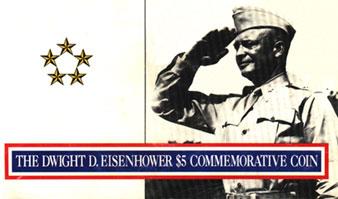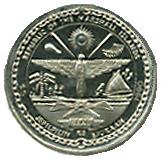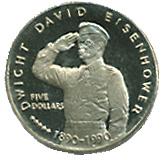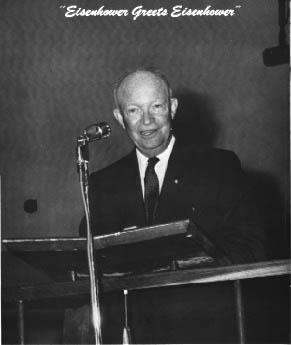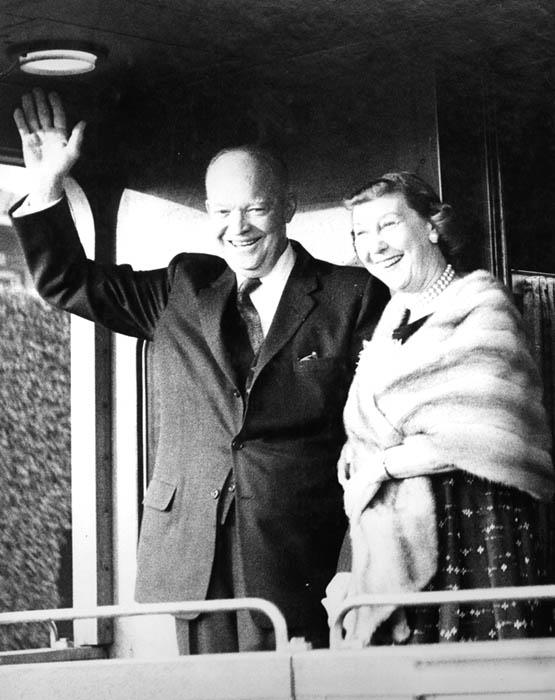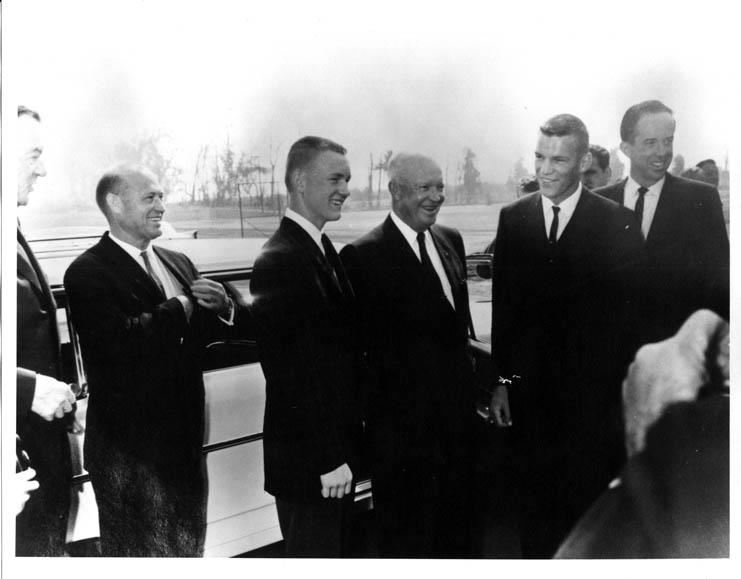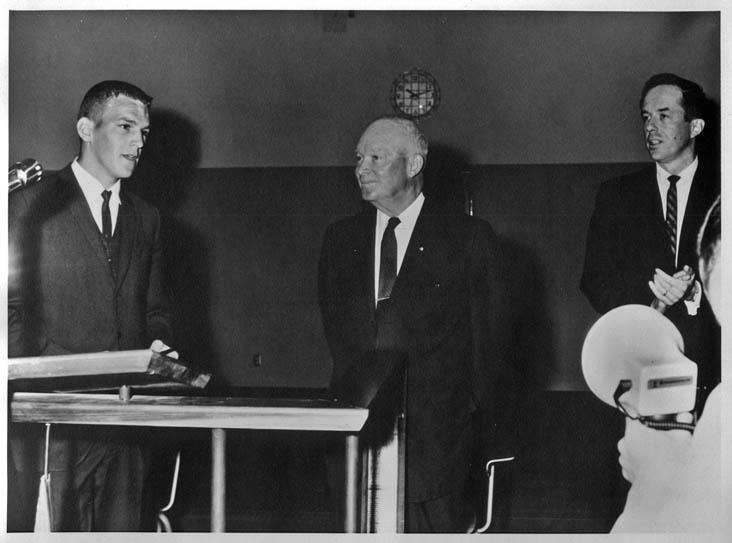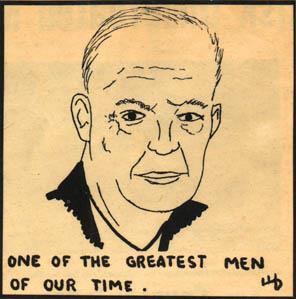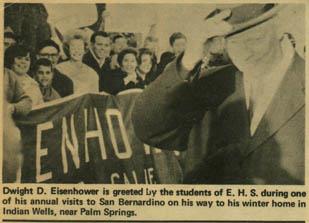Introduction
-
General Dwight D. Eisenhower visited Eisenhower High School on March 22, 1963.
Unfortunately, many details from his visit now are beginning to slip beyond recollection. In the picture below, two of the dignitaries cannot be identified. It is believed that one is Mr. F. Eugene Mueller, Superintendent of schools. Can anyone help us identify the pictures?
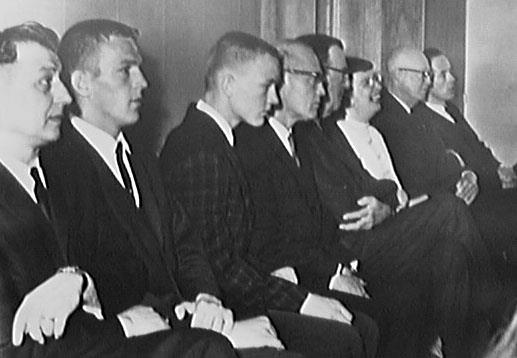
Seated l to r: Mr. Leslie Schumacher, Vice Principal; Randy Wheaton, Sr. High ASB President; Bill Vaughan, Jr. High ASB President; unknown; unknown; Mrs. Helen Dollahan, Vice Principal; General Eisenhower; Mr. Edward Ryan, Principal
Memorial Service
-
1969 recording of memorial service at Eisenhower for Dwight D. Eisenhower
Ladies and Gentlemen, at this particular point I will ask you to remain quiet with no kind of applause. When I ask you to stand very shortly, I will ask that you remain standing until the invocation is completed.
Will you now stand for the National Anthem.
--Invocation--
Today we are gathered to honor one of the greatest men, citizens and statesmen the world has known in the 20th century - Dwight David Eisenhower. Destiny chose this man, above all others to lead our nation in a time of trouble and turmoil. The eight years he held in office were eight of the most tension ridden in our history. This man who gained his stature as a general in the bloodiest war in our history, whose heart had to make the decisions to send men to their deaths at Normandy, the Bulge, and the whole European theater was the man who lead our country through the eight years of peace in a most troubled time. And after a valiant struggle against his ailments, he died this morning. Perhaps it was these important and hard decisions that placed the extra burden on his heart and conscience. But truly it is ironic that a man who was a leader in war was also such a great man in peace. In losing Dwight David Eisenhower, the United States and the world have lost a true friend and statesman. But he will live, old soldiers never do die, and let us here affirm that neither will our namesake ever fade away.
So that our composition may be more meaningful to you, we would like to translate the words, they're very short, very simple "Christ Be Merciful" -- Choir sings
A slight deviation from the program, yesterday, the student council on behalf of the Eisenhower student body sent a telegram. We will ask Carol Wasson at this time to read the telegram to you:
General Eisenhower, it seems unjust that a heart of such valor, having been so burdened by the decisions of command and world leadership should not go on forever. Perhaps it will be of some comfort to know that the students and faculty of Eisenhower High School will never allow what the man, the commander-in-chief, the peacemaker, the statesman, our president, the world leader, our namesake, stood for, to ever fade away from us. In that way, we affirm that you will live forever. Each of us, in his own way, prays for your recovery.
In this audience there are a few staff members, and in the class of 1969 we find the last of the students who attended Eisenhower 6 years, when we were a combination Jr./Sr. High. These are the people who will remember, and never forget a day in March of 1963, when President Eisenhower dedicated this gymnasium. Many of us of WWII vintage will always think of him as General Ike. Today we will hear a recording of his message to the Eisenhower students and staff.
1963 recording of General Dwight D. Eisenhower
First of all welcome students of Eisenhower Sr. and Jr. High School, and the many parents and adults who are here. There is no need to mention we're honored, and privileged and joy? any other ____ for Eisenhower Sr. high school students. Very few high schools in history have had this honor, to have a president or ex-president come and gratify their school with his works. Our school is named after a great man. I now give you - President and General, Dwight David Eisenhower.
Mr. Ryan, Mr. Mueller, Mr. Wheaton, Mr. Vaughan, faculty, students and friends of the Eisenhower school. This is a unusual and indeed unique honor for me. All over the world I have addressed academic audiences: universities, colleges, and secondary schools. But never before has it been my privilege to address a body of the school that bear my name. And I am indeed complimented that this city, this area, named their school after me. So I thank each of you that had a part in it.
I noticed it on the schedule I am slated for a few remarks. Now I could spend all of that time telling you the things that I do NOT know about, that I SHOULD know I suppose when I'm (was) a high school student. Even the vocabulary of the average high school student today rather puzzles me. (Chuckles) And I'm not talking about, you might say, the more social parts of vocabulary. I'm talking about the scientific. When I took physics, we never heard such words as electrons and neutrons, I know nothing about space and nuclear science. And particularly I do not know anything about this new mathematics. Every time a mathematic teacher tells me about it I seem to be more bewildered. I had one just yesterday brought a class up to ___(El Dorado)___ and she said she taught math. And I said, "Well what do you mean when you don't have a base of ten?" After she got done, I _____. Its not her fault but mine.
But there a few things that I think I do know something about. I know about the kinds of governments that we see and have today in our work throughout the earth. We have them in different scales of freedom and some places where freedom is completely denied. Now if there is any one single thing, any one subject, that I believe every student should be learning something about from the time he is in the primary class until he's finished his doctorate in education and then throughout the entire rest of his life is this. How can we make self-government work? I understand that I'm going to have the privilege this morning of going into one classroom in which we are going to talk about the problems of democracy. And I assure you I'm going to keep very still, because I want to learn something. I want to learn what you people believe are the responsibilities of the student today. But I am certain of this. Each us must dedicate himself to doing his part in this business of self-government. And if he doesn't, he shouldn't be part of self-government. He is not truly a good citizen of the United States, unless he or she knows how to perform the duties, carries the responsibilities, and enjoying the rights that self-government can make upon the individual. Now if she wants to know how to do it, she must know what it is. What are these (dangers). Or he or she will have to know what those dangers are. The risks. the weaknesses and the strengths of democracy.
I am sure that in the class that I'll visit, the students have read about ___Nupali___ and his observations about democracy, the ____ field, and many others. Every one of them, has learned 100 years ago, more than 200 years ago that other authors, that democracy is never going to last unless each gives into it more than he takes out. When we begin to discover that we can support ourselves by digging into the federal treasury and we're not ready to do this by self dependance. Doing our part in the whole society and the whole society in which we are a part, then democracy is weakened and eventually will disappear. A professor writing 200 years ago, he wrote about the extinction of democracy in the Athenian republic of two thousand years later. And he said the citizens learned that by their votes they could take for themselves out of the federal treasury. And then we were done.
Now today if I could leave with you just one thought, it would be this much as you will learn from your teachers and professors about the general facts of life, the culture of America, the scientific beginnings and elementary science that you'll be taking, you just must learn how are you going to sustain your God given rights - to be yourself, a free citizen, living in the proudest and richest and finest country in the world and your going to carry the responsibility to do that yourself because in the long run if you don't do that there IS no self-government. By no means do I want to talk like I am warning from a malediction that is taking place or anything of that kind. I just say that the very nature of democracy demand that every single one of us is aware of its strengths, of its weaknesses and there'll be all kinds? _with our whole hearts? And as long as we do I assure you America will go on down through the red lanes of time, leading people to greater happiness, greater provenance, secure peace, and indeed to higher spiritual, intellectual, and material status. This is the American mission in the world and it can be done only in freedom. As long as she enjoys every single bit of self-government. So I congratulate you on your great opportunities and I shall watch you and all your compatriots throughout the United States of your age as long as I live, to see how you measure up or rather how eagerly you dove into the fray to defend self-government.
To each of you I extend my thanks for your cordial welcome, I assure you again its a tremendous honor for me after these some three years or four years now to come over here and to greet you, to say to you - I'm delighted that your school carried my name. Goodbye, good luck.
Conclusion of 1969 recording
Benediction -- Choir sings
Playing of "Hail to the Chief"
Photos from Eisenhower's Visit
Memorabilia
-
Memorabilia from the Eisenhower Museum in Abilene, Kansas
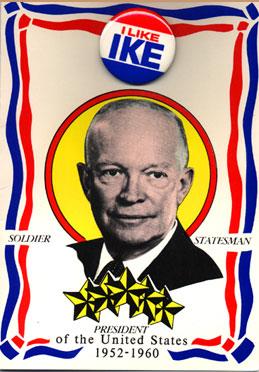
Dwight David Eisenhower was a towering leader. Few have approached his impact on both the national and international scene. Ike's journey to the summit of global affairs began in Kansas where, for two decades, his character, intellect, and beliefs were shaped by his family and the social and cultural environment of Abilene.
--Text from inside the souvenir card.Library Informational Program Cover
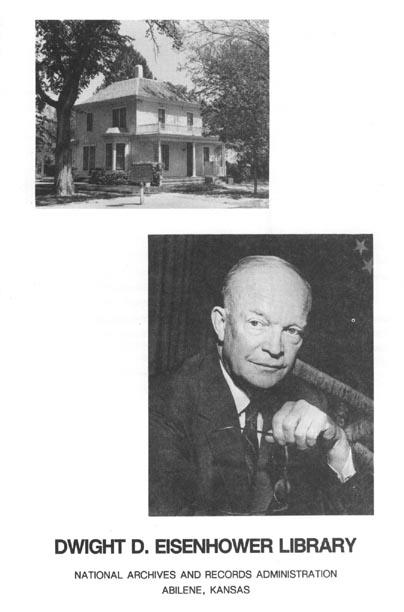
Inside the Library Informational Program
Click on each page to view full size pdf file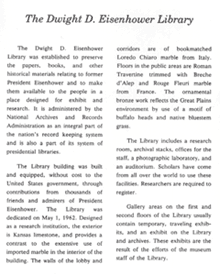
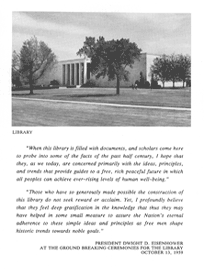
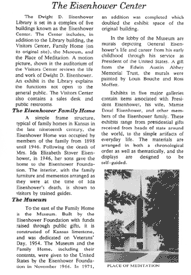
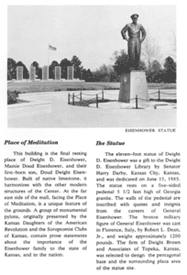
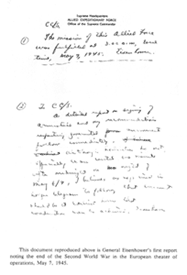
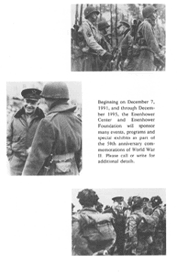
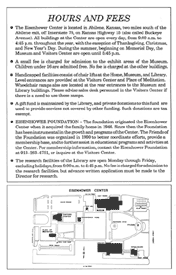
Eisenhower Bust Acquisition
-
How the Eisenhower Bust Came to EHS
An article from the May 17, 1963, issue of "The Eagle's Eye" (Eisenhower's student newspaper), relates the story of how the Eisenhower bust came to Ike. The Italian sculptor, Valerio Valentini, sent a letter addressed to the principal. Using the style of Italian writing (which may seem flowery to us), Valentini referred to Mr. Ryan (principal) as "Illustrissimo Signor Direttore," or illustrious director.
As was printed in the newspaper: "For the benefit of the student body it was decided to publish parts of the letter from Valentini. In that the letter was written in Italian and was extremely difficult to translate exactly, it is impossible to print the total correspondence."
Following is the excerpt as it was printed in "The Eagle's Eye."
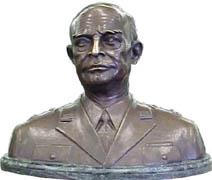
Most Esteemed Director of E.H.S.
I have read in the paper that in your city Eisenhower has dedicated a great school named after him. I have always admired this famous general. So when he was named President I modeled this worthy sculpture in bronze with the intent of bestowing it as a gift of admiration and modest gratitude for all the generous help that he had given my people in the hour of need. I could not accomplish my intentions. The Secretary of the White House, because of rigorous protocol, wrote to me that the president could not accept gifts unless from close relatives."
The sculptor went on to say that he decided to give the statue to E.H.S. and requested that it be placed where everyone could admire it.
Later that same year, the November 22, 1963, issue of "Eagle's Eye" announced the arrival of the bust from Italy. The article contained more information about Valentini, and his reasons for creating the bust and how it ended up at Eisenhower.
Following is the article from the November, 22, 1963, newspaper:
The bronze, twenty-inch high statue of General Eisenhower in uniform arrived at school last week, terminating its long journey from Italy.
Its creator, Valerio Valentini, a young Italian sculptor who admired General Eisenhower during his war days in Europe, made up his mind that when he became more experienced in the art, he would sculpt a bust of Eisenhower and present it as a token of friendship.
When the work was completed in 1953, the General had become President of the United States. Valentini discovered that law prohibits U.S. presidents from accepting gifts from foreign countries. So the bust stayed in Italy.
The publicity surrounding General Eisenhower's visit to EHS last spring resulted in a letter from Valentini stating that he would be happy to donate the bust as a gift. Consequently, the Student council took over and paid for its shipment from Italy to Los Angeles, and the ensuing C.O.D. cost from Los Angeles to Rialto.
For many years, the bust resided in the Eisenhower library. A legend surrounds the bust, known as The Eisenhower Myth - rub his nose for good luck before a test!!
The Eisenhower bust is currently located in the main office trophy case.
Eagles Eye Eisenhower Issue
-
Eagle's Eye Dwight D. Eisenhower Issue
According to the Eagle's Eye (October 18, 1968) --
President Johnson has proclaimed this week as "Salute to Eisenhower" week in honor of the 34th President of these United States of America, Dwight D. Eisenhower. The Eagle's Eye is glad to join in this salute to this great General, President and statesman.
On behalf of the Eagle's Eye Staff, I wish President Eisenhower a happy birthday, and health and happiness in the years to come. -- Craig Staats, editor
The issue contained several articles about Ike, including:
- A Biographical Sketch
- In Tribute to a Great Man
- To Ike from Eisenhower
A Biographical Sketch by Bill Hagaard
Dwight David Eisenhower was born in the year of 1890. Sixty-two years later he became the 34th president of the United States and was to go down in history as perhaps one of our greatest presidents.
He was not the greatest student when he was in the lower grades such as Grammar School. He began to "sharpen up" when he entered High School and was admired by the other students. He graduated from school in the year of 1909. The school he attended was Abilene High School, Abilene, Kansas.
For his academic achievements in school he was honored with the choice of either attending West Point or going to the U.S. Military School. In 1910 he decided that he would join the United States Academy.
He was sent overseas during the first World War but he never saw action because, before his ship got to Europe the war was over.
Before the second World War, he finally began his climb to the top of the "elite corp" of the military. Finally around the middle of World War II, he became the commander of the U.S. forces in Europe. He fought in Europe for about two and one-half years. The troops that he was commanding were fighting against the Germans and the Italians. Soon Eisenhower's troops were fighting the Germans.
Many people admired him at home and wanted him to run for the presidency of the United States. He refused to enter the New Hampshire primary and asked the Secretary of State to take his name off the ballot.
He decided that he would rather become the president of Columbia University. He served at that post for about three years, and it is interesting to note that he served without pay for the many services that he rendered the University.
With many people goading him to run in 1952, he heeded their pleas and announced that he was a candidate for the presidency of the United States. In a bitter fight with Senator Taft, he won the party's nomination on the first ballot. In the general election he defeated the democratic candidate for president by over 6 million votes. The '52 election proved that the people of the United States were united in a quest for the end of the Korean War. He became our 34th president on January 20, 1953.
In 1955 the nation was shocked to hear that the President had suffered a major heart attack. It was described as a major coronary thrombosis. Amidst all of the rumors that were circulating around the nation that he would not run for a second term, he announced that he was well enough to run for president.
In the 1956 election the people confirmed their belief in him, and they voted overwhelmingly for him for president. This time he won by over 9 million votes, captured 41 states, and defeated rival Adlai Stevenson for the presidency.
In 1960 when Nixon ran for president, Eisenhower enthusiastically supported him. But it has been learned that Eisenhower was not in good health at the time and that Nixon had told him even if it would cost him the election he did not want Eisenhower to get too excited and possibly suffer a fatal heart attack. Eisenhower complied with Nixon's wishes and did not campaign anymore for his Vice-president.
Eisenhower is now retired from the fierceness of political campaigning, and is semi-retired but still active as a person. He has had many proud accomplishments as president; and I feel that he was one of our finest presidents.
In Tribute To a Great Man
President Johnson has proclaimed the week of November 13 as "Eisenhower Week" in honor of the 34th President of these United States, Dwight D. Eisenhower.
In this time of rampant disrespect for the office of the Presidency, and the man who holds it, it is illuminating to look in retrospect at Eisenhower's terms as President.
Unquestionably, Dwight D. Eisenhower was one of the most popular Presidents this nation has had in recent years; a poll places Eisenhower high on the most admired Americans list.
As president, Eisenhower:
- Took an internationalist stance, vigorously supporting the United Nations and aiding the war-ravaged countries of Europe.
- Pressed for solution by negotiation to the Korean conflict and succeeded in helping to end the war on July 27, 1953.
- Was responsible for legislation for housing, a new tax program, and a better social security system.
- Pleaded for states to abide with the Supreme Court's landmark decisions ending racial segregation in American schools.
- During the 1952 Presidential campaign, when Eisenhower ran against Adlai Stevenson, Life magazine covered the campaigning: "In his aerial reconnaissance of the Democratic South, Ike proved his strength as a campaigner. Everywhere the crowds were enormous, friendly, eager to return his famous grin with a neighborly smile. In Philadelphia, where 250,000 crowded the streets, he was greeted with an enthusiasm that that great Republican stronghold had never given to Dewey or Wilkie.
"His speeches were blunt rather than eloquent. He was angry about corruption in Washington; he berated the Administration for frittering away the hard-won peace, and he was anxious to reassure farmers."
Eisenhower's quotes in the campaign ran in the "it's time for a change' theme, but also were representative of a moderate and progressive candidate:
"There is also need to bring hope and every peaceful aid to the world's enslaved peoples."
"The one way, the only way, to win World War III is to prevent it … That is the cause to which I now call America's young people. It is a cause for every American."To EHS From Eisenhower by Imogene Stewart, Journalism Advisor
When the name of Dwight D. Eisenhower was chosen for our high school, it was more than "choosing a famous name out of a history book". Our contact with General Eisenhower has been a warm interchange of admiration, gratification, and warmth. Students of E.H.S. have felt and known this every year as they send a delegation to meet the Eisenhowers on their arrival in California.
Last spring General Eisenhower and President Johnson met at March Air Force Base, two of our reporters went out and personally shook hands with them, took pictures, and ran a special pictorial feature in our school paper. Shortly after this, Eisenhower suffered a heart attack and, as you remember, was at March Air Force Base Hospital. The Eagle's Eye staff sent him a copy of the special issue mentioned above and a get well card signed by all the journalism students. About this time, Eisenhower was taken to Walter Reed General Hospital. Still, our correspondence caught up with him and he was generous enough to reply. The Eagle's Eye staff would like to share this letter with you.
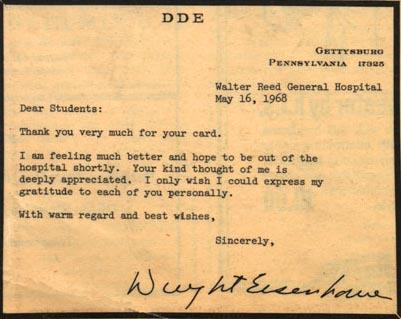
Commemorative Coin
-
World War II and Dwight D. Eisenhower
Dwight David Eisenhower
The Second World War truly became a war on a global scale when the United States hurled its military might into the conflict in December 1941. Though a key element to the eventual Allied victory, many problems faced the fight for freedom. Not the least of these was choosing a single leader to direct the campaign on the European Theatre. To lead with any degree of success would take a firm, yet careful hand. One man had these qualities: Dwight D. Eisenhower, named Supreme Commander of the Allied Forces on January 16, 1944, was a steady hand in a dire situation. Had any other man been chosen, the outcome of the war might have been different. Quiet, calm and certain, Eisenhower led a group of egotistical and sometimes hardheaded subordinates with brilliance. He urged complete cooperation among Allied officers and troops, vowing to ship home anyone who didn't comply on a "slow boat" without an escort. Thus he honed the concept of "coalition warfare" to a fine edge. Though some of his decisions were controversial, he stuck to them under a barrage of criticism. Because of this, he gained respect among his peers and world leaders as the man who gave freedom the final victory.
The Master Strategist
Eisenhower's most brilliant maneuver came on June 6, 1944, with the Allied invasion in Normandy, D-Day. With all the brilliance and innovation of a master chess player, Eisenhower directed the invasion. Boldly, Ike ordered the attack to begin on June 6 after a twenty-four hour delay due to bad weather in the English Channel. The order was a gamble, based on a possible break in the weather, but it worked. The entrenched Germans were taken by surprise when the first of the troops swarmed the beach at 6:31 a.m. The success of the Allied thrust was a major coup for Ike in his rise to fame. Within days, the beachheads were linked in one united front and the beginning of Hitler's demise was at hand. Then - again under Ike's bold command - the troops sliced through France, crossing the Rhine River into Germany just seven months later, emerging victorious on May 7, 1945.

Story of the Dwight D. Eisenhower Coin
The Dwight D. Eisenhower $5 Commemorative Coin was issued by the Republic of the Marshall Islands in 1990 to commemorate the 100th anniversary of Eisenhower's birth on October 14, 1890. This cupronickel coin is legal tender of the Marshall Islands, which was one of the key battlegrounds in the Allies' march across the Pacific during World War II. The obverse of the coin bears a commending portrait of Eisenhower in his role as a 5-star General, and reflects his strong leadership and firm commitment to the cause of freedom. The design was created by the internationally acclaimed sculptor and coin designer, Mico Kaufman, who has also created numerous award-winning medals and is known for his precision and attention to detail. On the reverse of the coin is the national seal of the Marshall Islands which appears on all its coinage. The motto, "Jepilpilin Ke Ejukaan," means "Accomplishment Through Joint Effort," and the design centers on the nation's symbol, the Spirit Bird of Peace. The Marshall Islands became independent in 1986.
